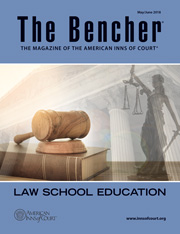Nomophobia: A Litigator’s Disability
The Bencher—May/June 2018
By Richard K. Herrmann, Esquire

 It was not long ago, I found myself in a large courtroom not far from home. Opposing counsel seemed particularly irritating. The judge had no control of the courtroom and the court clerk was so engrossed in the computer screen, it was clear he was playing some kind of game. I found of all these annoyances rather strange, since petty irritation is just not part of my personality. It was as if I were someone else. I was anxious and found it difficult to sit still.
It was not long ago, I found myself in a large courtroom not far from home. Opposing counsel seemed particularly irritating. The judge had no control of the courtroom and the court clerk was so engrossed in the computer screen, it was clear he was playing some kind of game. I found of all these annoyances rather strange, since petty irritation is just not part of my personality. It was as if I were someone else. I was anxious and found it difficult to sit still.
As time went on, things grew worse. I found myself looking down at my hand every few minutes for no reason at all, as if I had a tick. My hand was fine, although there was a slight twitch and I noticed beads a perspiration forming. The court hearing itself was insignificant. The judge reserved decision and the client was not concerned about the outcome. I gathered my things, retrieved my electronics from the locker in the lobby and exited the courthouse.
Although my experience in that courtroom did not repeat itself, I did have occasion to discuss it with a friend of mine who happens to be a jury psychologist. He stared at me straight in the eye and said, “You were experiencing classic symptoms of Nomophobia.” Of course, I had no idea what he was talking about, and then he explained. Nomophobia is a condition coined in 2010 as a result of a United Kingdom study of mobile phone users. It is referred to as a “psychological syndrome in which a person is afraid of being out of mobile or cell phone contact.” The name is short for “no mobile phone phobia”.
A fair amount of literature exists on the subject, and an actual disagreement exists as to whether the condition is a phobia or symptoms indicating other mental illness such as separation anxiety or actual addiction. https://www.allaboutcounseling.com/library/nomophobia/
At least half of us have been in conferences where those in the next seat are reading e-mail under the table (the other half of us are the ones sending the e-mail). While everyone knows this form of conduct is rude, it may be we are too unforgiving if, in fact, those doing it are suffering from some form of mental disorder. You will be pleased to learn there is treatment for those afflicted with this condition,
which some have compared to internet gambling or shopping addiction. Help is available in guides for self-treatment, support groups and treatment centers. https://www.psychguides.com/guides/treatment-for-addiction-to-smartphones/
Whether it is called a phobia or an addiction, it is already affecting us as lawyers in a number of ways. Studies on the subject have been made and papers written, such as “‘Do You Plead Connected?’ Understanding How Lawyers Deal With Constant Connectivity” https://scholarspace.manoa.hawaii.edu/bitstream/10125/50542/1/paper0655.pdf Personal injury lawyers are focusing their keen eyes on it. We all know driving while texting is a very real problem and the cause of many accidents. It is also the subject of much lawyer marketing. https://www.williamscedar.com/smartphone-addiction-rising-car-insurance-premiums/ and https://www.missourilawyers.com/blog/increase-smartphone-use-u-s-drivers-leading-deaths/
Of course, the subject of technology and addiction has been around for a number of years. As early as 2007 the question arose as to whether technology addiction qualifies under the American Disabilities Act. The statistics are staggering and are well laid out in a 2016 complaint against Apple in a wrongful death action resulting from an automobile accident in California. Modisette, et al v. Apple, Inc., CA 16CV304364 (12/23/16, Santa Clara County, CA). The complaint makes reference to a number of studies, as well as the existence of the Center for Internet and Technology Addiction at the University of Connecticut School of Medicine.
When I began research on this article, I must admit my tongue was placed somewhat well within my cheek. Now, however, it is quite clear we all have a problem and it is not limited to a particular demographic. Cell phone misuse and abuse is a real-life issue and needs to be addressed at all levels. The first hurdle is to understand a problem exists.
Hello everyone, my name is Richard and I have a cell phone.
Richard K. Herrmann, Esquire, is a partner in the firm of Morris James in Wilmington, Delaware. He is a Master of the Bench in the Richard K. Herrmann Technology AIC.